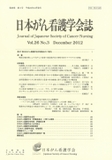Japanese
English
- 販売していません
- Abstract 文献概要
- 参考文献 Reference
- サイト内被引用 Cited by
要旨
本研究の目的は,がん患者の配偶者のソーシャル・サポートに関する体験についてネガティブな側面も含めて全体像を明らかにし,がん患者の配偶者の精神的健康を促進する看護の手がかりを得ることである.がん患者の配偶者13名を対象に,半構造化面接法によりデータを収集し,質的帰納的に分析を行った.その結果,がん患者の配偶者のソーシャル・サポートの体験は【サポートの必要性の自覚】【サポートを受けることへの躊躇】【サポートを期待する相手の吟味】【サポートの取捨選択】【受けたサポートの有益性の認識】【受けたサポートによる感情の生起】【関係のもち方によるサポートの調整】の7カテゴリーに集約された.これらの体験において,配偶者はサポートを受けることを躊躇し,サポートを受けないことや,有益でないサポートを受けていることが明らかになった.看護への示唆として,①配偶者の言いづらさを理解し,察してサポートを提案,他者に代弁する,②家族内のサポート力を高める働きかけと関係調整,③サポート不足の配偶者に潜在的サポート提供者の掘り起こしや社会資源の紹介をする,④配偶者への有益なサポート提供であると認識し,患者のケアを行う,⑤有益でないサポート提供者との仲立ちや,有益でないサポートへの配偶者の対応力を高める,が得られた.
Abstract
The purpose of this study was to clarify how spouses of cancer patients experience social support, including positive and negative aspects, so as to identify how nurses can better promote their mental health. Data collected from 13 spouses of cancer patients through semi-structured interviews were analyzed by a quantitative inductive approach.
As a result, the following seven categories were extracted: 'awareness of the necessity of support', 'hesitation in receiving support', 'careful evaluation of support providers', 'deciding whether to accept support', 'understanding the usefulness of received support', 'emotions aroused by receiving support', and 'tailoring support based on the relationship with support providers'.
The results showed that some spouses are hesitant to accept support, some do not receive support, and some receive non-beneficial support. Through discussions, suggestions for nursing practice were extracted, including:(1)to suggest and provide appropriate support by understanding their hesitation in mentioning their needs, and to ask their resources to provide support on their behalf(2)to help increase the ability of family members to support each other and adjust their relationship,(3) to find potential support providers and explain what social resources are available for spouses not receiving enough support,(4)to understand that providing appropriate care to patients is actually useful for spouses, and(5)to mediate between spouses and non-beneficial support, as well as to increase spouses' responsiveness when dealing with non-beneficial support.
Copyright © 2012, Japanese Society of Cancer Nursing All rights reserved.


